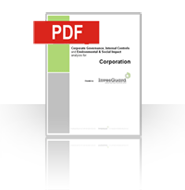-
Advantages of SubscriptionSubscription provides you the right to use all 3 levels of data.
The third and most detailed level of data which is available only to subscribers provides the most comprehensive explanation of the rating profile of companies in our database. It will provide you with information on why we think the Board Effectiveness of a company is weak or why the Audit Committee of a company can probably do better. This information may be that key element that you need over and above critical financial data to give you a complete corporate picture.
For additional information on why you should use InvesGuard please click here.
blog:
Guarding Investments one post at a time
Lehman’s Directors “Did Not Breach Fiduciary Duty”
Quick update from the bankruptcy courts vis-a-vis Lehman Brothers.
The report turned in by the examiner appointed by the court covers 3 broad areas-
1.Why did Lehman Fail?
2.Are there valid claims for preferences or voidable transfers?
3. Are there valid claims arising out of the Barclays transaction?
The most relevant aspect from a Governance standpoint was the section that tried to understand the role (or lack thereof) that Lehman directors played in the entire Lehman failure.
According to the report,
" The Examiner Does Not Find Colorable Claims That Lehman’s Directors Breached Their Fiduciary Duty by Failing to Monitor Lehman’s Risk‐Taking Activities "
Lets take a step back, in fact, lets take several steps back to 2008 when Lehman filed its proxy statement.
Here is a list of Lehman directors who made up their Board Finance and Risk Committee and their corresponding 'relevant' experience.
1. JOHN F. AKERS- Retired chairman of IBM (retired in 1993), also formerly on the board of the Metropolitan Museum of Art.
2. ROGER S. BERLIND- Theatrical Producer
3. MARSHA JOHNSON EVANS-Former CEO American Red Cross and former executive director of Girls Scouts as well as a retired naval admiral.
4. ROLAND A. HERNANDEZ-Former CEO of Spanish Language Television Station
5. HENRY KAUFMAN- President of Henry Kaufman & Company, Inc., an investment management and economic and financial consulting firm.
According to Lehman's Finance and Risk committee charter, members were required to "review(s) and advise(s) the Board of Directors on the financial policies and practices of the Company, including risk management. The Finance Committee also periodically reviews, among other things, budget, capital and funding plans and recommends a dividend policy and Common Stock repurchase plan to the Board of Directors."
Which of these 5 directors you think would be able to provide oversight over Lehman Brothers' Risk Management practices? The 'girl scout' perhaps or maybe even the 'theatrical producer'?
I think even for the most basic and junior level job, most hiring managers will ensure that incumbents have relevant experience....and these were senior oversight positions with a company that were filled in by persons with great but irrelevant experience.
Now that we know that Lehman had such 'illustrious' and highly 'accomplished' directors on their Board Finance and Risk Committee, was Lehman's failure just a matter of time?
The clean chit given by the Court appointed examiner to Lehman's Directors is a slap in the face for corporate governance.
A copy of the examiner's report (Vol 1 of 5) is attached below this post. Enjoy it.
Anyway, for those interested, InvesGuard regularly tracks this data for all companies. We have put a few reports out there that outline this and many other non financial metrics.
Lehman Brothers Examiner's Report, Vol.1
Thursday
March 11
Move Over Goldman, Wells is here!
A vigilant reader pointed out that this post had some repeats in a couple of paragraphs.....Wordpress went a little crazy when I tried to insert that table at the end.
My apologies to everyone. The post is now clean.

Sometime back,we covered a post investigating whether financial institutions are rushing to re instate compensation and pay policies now that they were out of the emergency funding program- TARP. There were several companies that we named here that changed their compensation structure including increasing cash salaries for senior executives.
One more that we are adding to that list is Wells Fargo. The changes instituted at Wells affect cash salaries of top executives . These changes have caused their cash salaries to jump so steeply that it could potentially eclipse any compensation issues that ‘all-time-poster-boy-for-excessive- compensation’- Goldman Sachs may appear to have.
On February 26th, the Board Compensation Committee (or Human Resources Committee as it is called over at Wells), made some changes to the compensation structure of its top executives. These executives are now to be paid their full salaries in cash versus being paid partly in the form of company stock which was the erstwhile compensation structure under Wells Fargo’s Long Term Incentive Compensation Plan.
Back in August 2009, salaries of these executives were increased to reflect an increased percentage of remuneration in company stock , but the cash portion of their salaries remained unchanged.
Wells Fargo repaid the entire amount it had borrowed under the Government’s TARP program in December 2009. Following this repayment, the Board Compensation committee of Wells Fargo increased the base salaries of the same senior executives yet again but this time the increased salaries will be paid entirely in cash with no stock component. These changes will be effective March 2010.
From the table below, it is painfully obvious that cash salaries for these executives have significantly jumped. John Stumpf, Chairman and CEO has seen his cash salary jump from $900,000 to $2,800,000 as was the case for Mark Oman(Senior Executive Vice President and head of Home and Consumer Finance), who had announced his retirement from Wells Fargo at the end of 2009. Not only does he continue with the company, but he also received a bump of $1,400,000 in his cash salary which takes his total cash salary to $2,000,000. As everyone knows, increments for middle to lower rung managers and staff are frozen at most companies with maximum salary increases of 2% to 3%. How does one justify this kind of salary hike of more than a 100%?
On the other hand, Wells shares have languished around $25- $27 a share. Wells Fargo closed at $27.34 a share on 2/26/2010. It looks like popular backlash against excessive compensation as well as the threat of regulation have not deterred Wells’ Board from rewarding executives for what appears to be an execution of their usual and not any kind of ‘above and beyond’ type of job responsibilities. With all the public attention on Goldman officers and their compensation, salary changes at other financial institutions seem to be going unnoticed under the radar.

Monday
March 1





